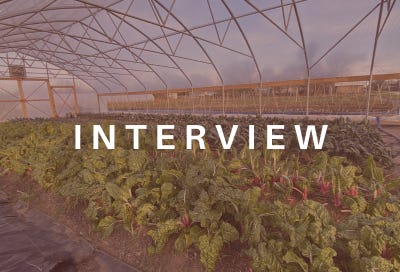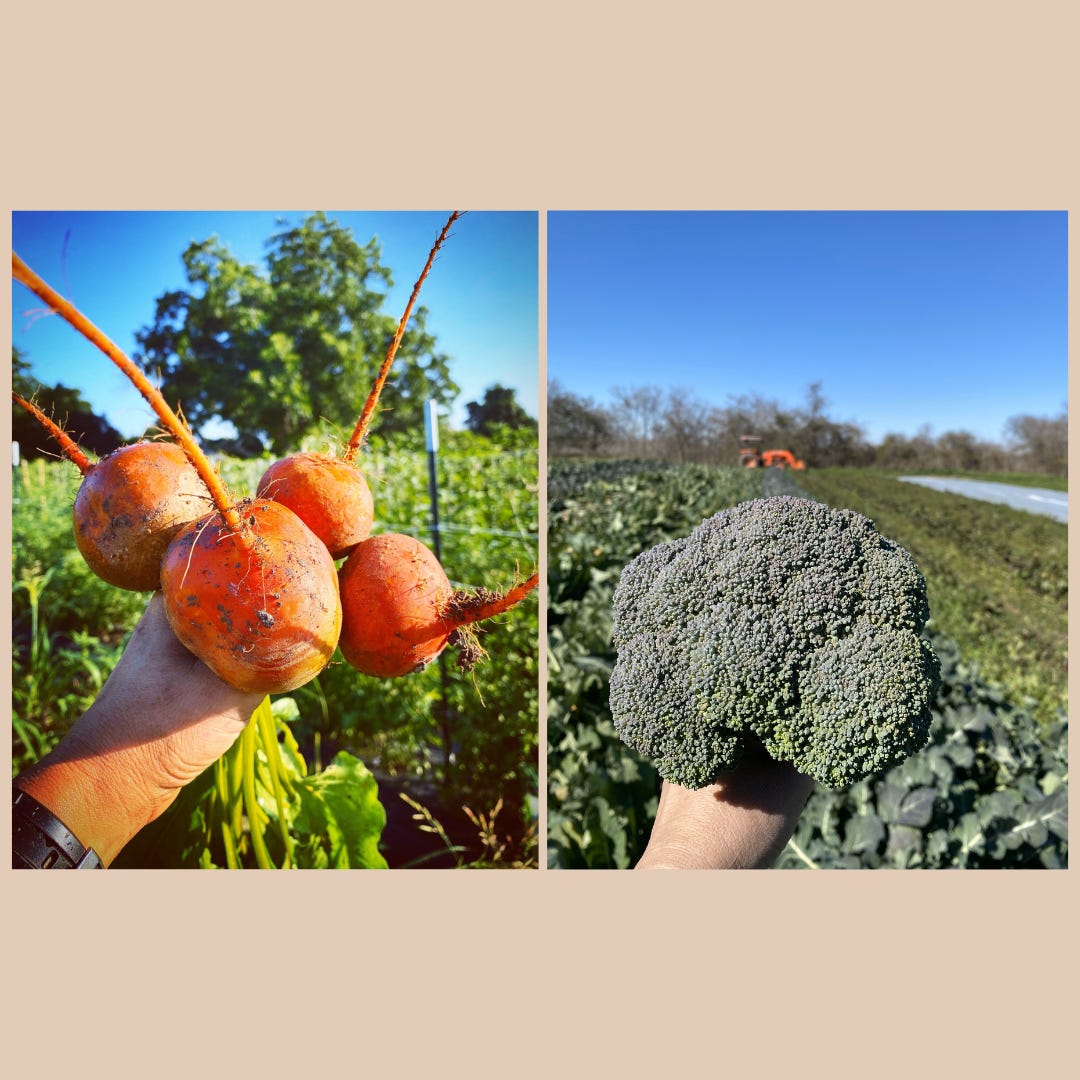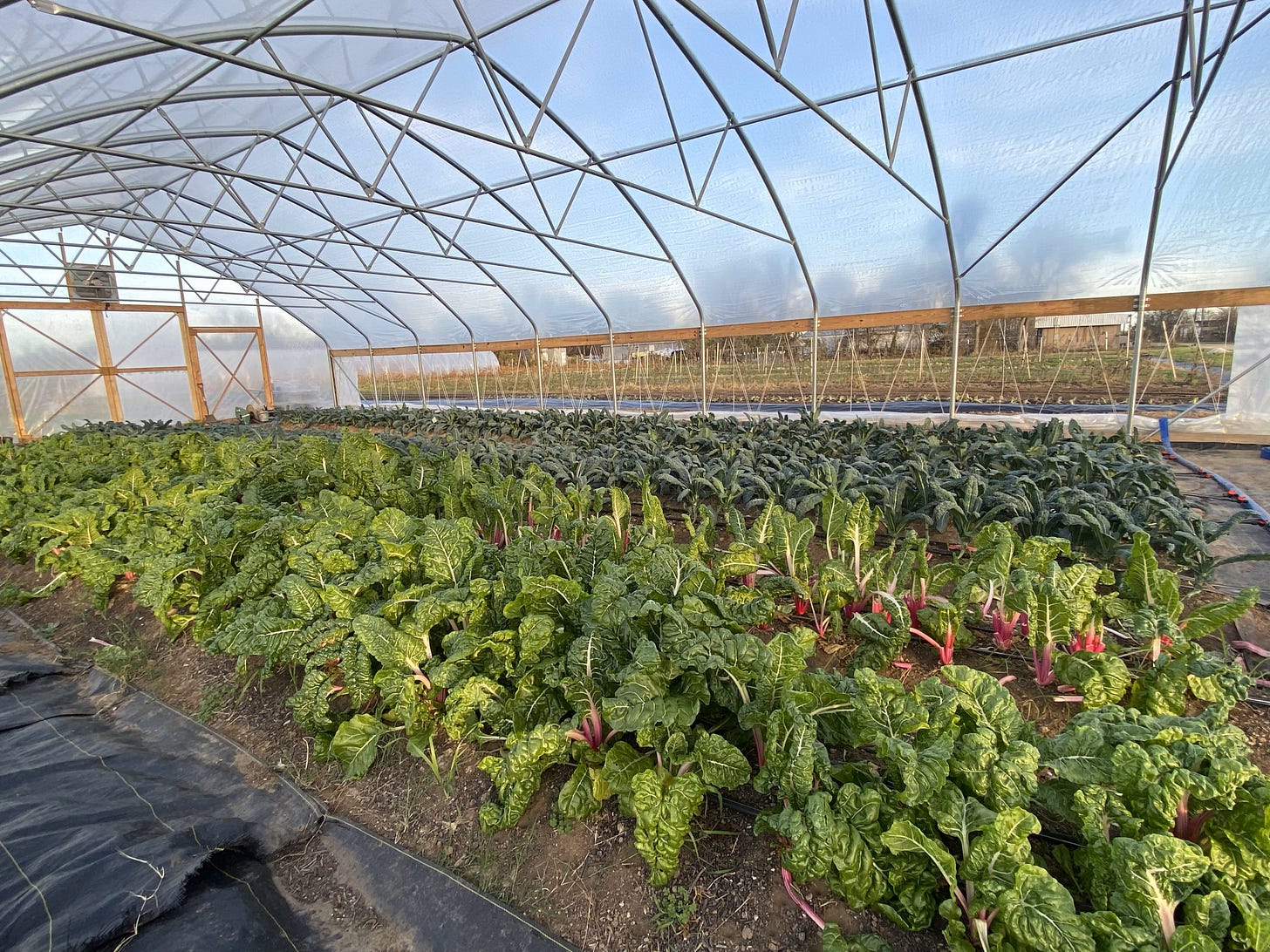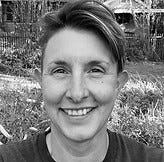I recently interviewed a beloved Farm Manager in my area, Amalia Staggs from Farmshare Austin, about her experience in small-scale farming. This conversation was such a joy and I expect anyone reading, even those of you on the other side of the planet, to be able to relate to aspects of Amalia’s career journey, perspective, and sense of purpose. Enjoy. 💫
How did you get into farming?
Farming was not part of my plan. I lived in Brooklyn for a time and grew some fresh herbs, moved to Seattle with more of the same and eventually back to Texas in 2011 - I tried growing that year but it was a drought year and proved to be discouraging. The point is, I liked gardening, but not in any serious capacity.
Come July 2020 I was laid off from what had been a very stable, predictable, though often miserable job of 13 years. Having never been laid off before and during such an uncertain time with the global pandemic I responded, naturally, by scrambling to find another job doing something similar to what I’d known.
I was talking to a friend one day about my job search and they wondered aloud, “why are you looking to go back to that world? That job let you go… in this moment you’re free to re-think what you want in a career” and they were right, I hadn’t slowed down long enough to really consider what else I could possibly do with my 40+ hours a week. Before we parted my friend said, “… and will you please go outside and get your hands in some dirt?!”
To this day neither of us know what inspired that statement, but there it was like some divine premonition.
Heeding my friend’s advice I took to the internet to get inspired and I discovered the concept of a “volunteer farm hand” and found that local farms were seeking them – I signed up. For about 3 months I volunteered regularly, and I couldn’t deny how happy I felt. It wasn’t just a good feeling, it was a calling. I really do think people are called to this work.
What I want people to know is that I started my farming career at the age of 45. It’s never too late to discover something new in yourself.
What was that career transition like for you?
Well, being a farmer is like being a teacher in our society – completely necessary & honorable, and yet extremely undervalued. Needless to say, it was a big transition financially from what I’d been used to.
I remember having conversations with my partner who is a creative entrepreneur and fortunately was very understanding and supportive. The sentiment was, “if this is what you want to do, then refuse to do anything else”.
So, we figured it out and I’ve been surprised to find that I’ve not had to change much about my lifestyle after all. Even without the support of a partner, I know I would have figured this out and made the necessary changes to commit to this calling.
What I want people to know is that I started my farming career at the age of 45. It’s never too late to discover something new in yourself.
-Amalia
If not for conventional values like salary and benefits, what value do you get out of farming?
The value I get is immeasurable. For one, the community in central Texas is so incredible, I get to be involved in the conversation in our area, I get to interact with the land here, I truly feel like I’m part of something meaningful.
Agriculture at large is a complicated undertaking (the pandemic showed just how many systems are broken) and someone like me can get lost trying to find my place in ‘big picture agriculture’ so instead I just focus on what’s in front of me.
Farming offers lifelong continuous learning. If I can keep showing up curious and teachable, if I can find ways to practice agriculture in better, more harmonious ways, even if it’s just in a tiny plot, who’s to say that doesn’t cause a meaningful ripple effect?
What are some of the hardest parts about farming?
The hardest thing about farming is that I want to do it all RIGHT NOW. By nature I’m impatient and it turns out none of this *gestures towards farm* is in my control.
Secondly, when I was envisioning being a farmer I didn’t realize that also meant I needed to be a mechanic, a carpenter, irrigation expert, etc.
Lastly, harkening back to my first hard thing… it’s really challenging to pace myself. There’s always something to be done. I have an enormous capacity for work and WILL burn myself out if given the chance.
How do you avoid burnout?
Originally, I thought I wanted to own my own farm, ha! I quickly realized I didn’t want to do anything alone. Having a healthy body & brain is the only way that I get to do this. The people and the culture we maintain are what prevent burnout.
I still believe farming is the most civilized job I’ve ever had - no one is sending me strongly worded emails at 10pm 😝 instead we eat lunch, we stay hydrated, we take breaks, we care about and check in with each other.
What is the best thing about farming?
I am happiest when I’m kneeling on the ground with my hands in dirt – planting, harvesting, weeding. I prefer to not listen to music or podcasts, just being out there immersed in the field is my favorite thing.
I also really like witnessing the growing process, watching the seeds germinate into baby seedlings and putting on leaves, it’s magic.
I tend to put myself onto the jobs no one else wants to do, especially when I was first starting out, y’know dragging out drip tape, hauling materials for hours, that sort of thing. Even on those days I’m still having more fun than any other job I’ve had.
In an ideal situation, with all the resources at your fingertips, how would you farm?
I’d love to keep moving in the no-till direction - more land would be helpful to designate more areas to rest or put in permanent raised beds. There are certain things we’re doing really well, but we’re only able to do them in bits and pieces; I would want to scale those things up.
I’d also like to start caring for the soil around the farm. The ends of our beds get pretty gnarly looking, it’d be cool if we could mulch the perimeter of farmed areas with several inches of woodchips!
If I’m really dreaming… if we had all the funding it would allow for a couple more people to be hired which would give me more time to focus on big picture planning – I’d want to use that time to slow down and be more observant, to tinker around more with KNF strategies and mushroom substrate that we have access to. Maybe I’d be able to finally find or make better compost sources, inoculate GOM…
I still believe farming is the most civilized job I’ve ever had - no one is sending me strongly worded emails at 10pm.
-Amalia
What does planning & coordination look like in farming?
When I first got into farming I worked for several months on a production farm with a person who had a brain for systems, so that was helpful! Now as a manager I want to be thinking 6 months down the line, it helps that farming is seasonal (I can’t really explain why that helps, but it does). It’s a lot of info to keep in my head at the same time… I work with other managers and we all do it differently.
I tend to think about it this way: in order to get task F done at the end of the week, we need to do A – D tasks. But even then I’ve learned you can’t be married to the plan. And I try to remind myself that I can’t “break” farming (aside from maybe burning the place down). There’s so much out of my control, all I can do is show up and treat the job as creative problem solving – farming is a puzzle. It’s also a little like theater: “yes, and…”, “the show must go on!”
Also as a manager, I never want to be the bottleneck for my team. I’m always thinking, “how can I set others up for success?” Do they have the tools they need to get the job done and are they in the right place, do they have access to me if they need to talk through something, can I make myself available with short notice when a tractor needs to be moved or some other task that only I (or few of us) can do… that kind of stuff.
Last question, what would make it easier to farm the way you want to farm?
Hmm…. more high tunnels, ha! You can still grow in soil, but they help the plants out during extremes (which we have plenty of here in TX)
Thank you to Amalia for sharing so much with us!
What do you think, could you relate to anything Amalia shared? Also, let me know - should we do more interviews like this?? 👇











Sooo relate to feeling impatient and wanting the veggies planted NOW and learning that I’m not in charge of what is going on. There is something much bigger at work.